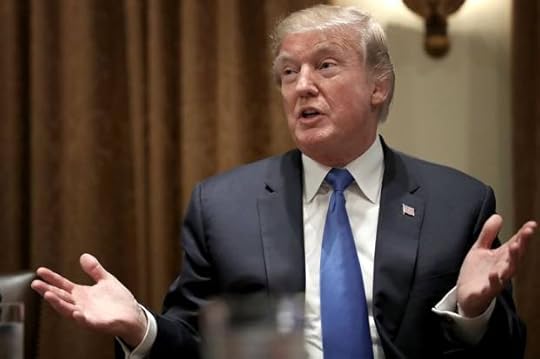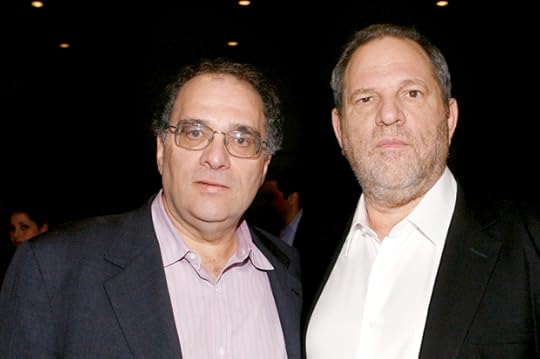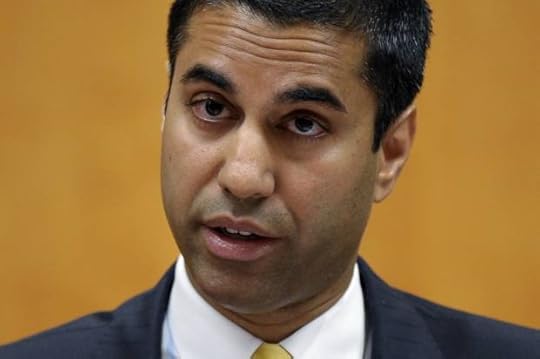Helen H. Moore's Blog, page 233
November 21, 2017
Head of Pixar, Disney animation takes six-month leave, apologizes for inappropriate contact

John Lasseter (Credit: Getty/Valerie Macon)
John Lasseter, head of Pixar and Walt Disney Animation Studios, announced Tuesday that he was taking a six-month leave of absence over unspecified “missteps,” in a staff memo. His absence was first reported by the Hollywood Reporter.
“I’ve recently had a number of difficult conversations that have been very painful for me. It’s never easy to face your missteps, but it’s the only way to learn from them,” Lasseter wrote. “As a result, I’ve been giving a lot of thought to the leader I am today compared to the mentor, advocate and champion I want to be.”
He continued, “It’s been brought to my attention that I have made some of you feel disrespected or uncomfortable. That was never my intent. Collectively, you mean the world to me, and I deeply apologize if I have let you down.”
Lasseter added that he especially wanted to apologize to “anyone who has ever been on the receiving end of an unwanted hug or any other gesture they felt crossed the line in any way, shape, or form,” giving some indication of complaints lobbied against him. “No matter how benign my intent, everyone has the right to set their own boundaries and have them respected.”
Lasseter said that upon talking with Disney, the parties were united in the opinion that stepping away from his position on at least a temporary basis is the right move. “My hope is that a six-month sabbatical will give me the opportunity to start taking better care of myself, to recharge and be inspired, and ultimately return with the insight and perspective I need to be the leader you deserve,” he said.
For Lasseter to take leave from his position as chief creative officer of Walt Disney Animations is no small thing. In the position since 2006, and Lasseter is widely considered a formidable figure in the entertainment industry and one of the reasons Disney and Pixar’s animated output continues to lead the field. Certainly, he’s lauded as one of animation’s most important players. Lasseter co-founded Pixar and helped create some of the studio’s most iconic films such as “Toy Story” and “Frozen.” Disney bought the studio in 2006.
“Known for his big-kid personality and penchant for Hawaiian shirts and bear hugs, he is widely credited with resuscitating Disney’s in-house animation studio during the last decade after a long period of struggles,” the LA Times wrote.
But as the list of accused men of sexual misconduct in Hollywood only grows, some employees reportedly began to discuss Lasseter’s “creepy” behavior according to Variety.
A Disney spokesperson said in a statement: “We are committed to maintaining an environment in which all employees are respected and empowered to do their best work. We appreciate John’s candor and sincere apology and fully support his sabbatical.”
Trump all but endorses Roy Moore: “We don’t need a liberal person in there”

(Credit: Getty/Win McNamee)
Before President Donald Trump boarded Air Force One on his way to Mar-a-Lago for his Thanksgiving break, he spoke with reporters outside the White House on Tuesday and essentially endorsed Alabama Senate candidate Roy Moore after avoiding a discussion about him for weeks. The president said that the country doesn’t need “a liberal person” to fill the state’s Senate seat that was left vacant by Attorney General Jeff Sessions.
“I can tell you one thing for sure,” Trump said, according to pool reports. “We don’t need a liberal person in there, a Democrat, [Doug] Jones. I’ve looked at his record, it’s terrible on crime, it’s terrible on the border, it’s terrible on the military.”
BREAKING. Trump On Roy Moore race— “we don’t need a liberal democrat in that seat.” pic.twitter.com/TulbsnMHFC
— Ryan Nobles (@ryanobles) November 21, 2017
It wasn’t an explicit endorsement of Moore, but it was certainly a condemnation for any Alabamian who plans to vote for Democratic candidate Doug Jones. Moore has been accused by several women of sexual abusing them or otherwise preying on them while he was in his 30s and they were teenagers, some of whom were minors at the time.
The White House has attempted to skirt around the question but have made their position quite clear: they definitely don’t want a Democrat to win, even if that means electing an alleged child molester — just ask White House counselor Kellyanne Conway. “Doug Jones in Alabama, folks, don’t be fooled. He will be a vote against tax cuts,” she said on “Fox & Friends” this week. When asked if she was telling people to vote for Moore, Conway said, “I’m telling you that we want the votes in the Senate to get this tax bill through.”
Moore and his supporters have not, and likely will not, back down from the Senate race, despite the allegations. Moore has denied the accusations categorically and claimed he didn’t know the women either. One pro-Moore pastor, Franklin Raddish, said that “more women are sexual predators than men,” Salon previously reported. “Women are chasing young boys up and down the road, but we don’t hear about that because it’s not PC.”
When reporters asked Trump about Moore’s accusations after he seemingly endorsed him, the president merely said that Moore has denied it. “Well, he denies it. Look, he denies it,” Trump said. “I mean, if you look at what is really going on, and you look at all the things that have happened over the last 48 hours, he totally denies it. He says it didn’t happen. And, you know, you have to listen to him also. You’re talking about, he said 40 years ago this did not happen.”
President Trump: “Roy Moore denies it. That’s all I can say. He denies it. And by the way, he totally denies it.” pic.twitter.com/Ipk7LkT9Of — CSPAN (@cspan) November 21, 2017
The standard echoes that of Fox Business host Maria Bartiromo, who said on Friday night, “There are no allegations against the president,” despite the fact that at least 16 women have come forward and accused Trump of some magnitude of sexual misconduct. The president has denied all allegations against him.
When asked if he was going to campaign for Moore, Trump said, “I’ll be letting you know next week,” per pool reports.
After being asked what his message to women was during this pivotal time, Trump replied: “Women are very special. I think it’s a very special time, a lot of things are coming out and I think that’s good for our society and I think it’s very very good for women and I’m very happy a lot of these things are coming out.”
After the impromptu presser, Trump boarded Marine One. He was flown to Air Force One, where, per pool reports, Fox News was playing in the cabin.
Claims Bob Weinstein paid $600,000 to Harvey’s accusers suggest the brothers were in it together

Bob Weinstein and Harvey Weinstein (Credit: Getty/Mark Von Holden)
Tuesday, Ronan Farrow released his third in a series of New Yorker articles detailing the alleged pattern of sexual abuse of media mogul Harvey Weinstein. Earlier, Farrow had talked to Weinstein’s accusers and, subsequently, detailed the lengths to which the producer attempted to silence and track them.
In his latest piece, Farrow dives deep into the system of settlements and payoffs Weinstein and those supporting him used to keep stories of harassment and assault out the news.
Farrow reports that, in exchange for $1 million, Filipina-Italian model Ambra Battilana Gutierrez signed a nondisclosure agreement to stay quiet about the time Weinstein allegedly groped her breasts and attempted to slide his hand up her skirt.
“I didn’t even understand almost what I was doing with all those papers,” Gutierrez told him. “I was really disoriented. My English was very bad. All of the words in that agreement were super difficult to understand. I guess even now I can’t really comprehend everything.”
“I saw him shaking and I realized how big this was. But then I thought I needed to support my mom and brother and how my life was being destroyed, and I did it,” she said of Weinstein’s attorney. “The moment I did it, I really felt it was wrong.”
“I felt pressured,” Gutierrez said, when her attorneys had advised her to accept the settlement, after the Manhattan District Attorneys office decided against pressing charges. “I was forced by the fact that newspapers completely bashed me, by the fact that I was alone, by the fact that I was twenty-two years old.”
“The Weinstein confidentiality agreement is perhaps the most usurious one I have seen in decades of practice,” an attorney familiar with the agreement told The New Yorker.
Gutierrez was just one of many women Weinstein apparently silenced with money and nondisclosure agreements over the least two decades. “He used these kinds of agreements with employees, business partners, and women who made allegations—women who were often much younger and far less powerful than Weinstein, and who signed under pressure from attorneys on both sides,” Farrow wrote.
“Repeat offenders are able to operate under a cloak of silence with the help of nondisclosure agreements,” Samuel Estreicher, a professor of law at New York University, who focuses on employment issues said.
Some of the sexual-harassment settlement payments were underwritten by Weinstein’s brother and partner, Bob Weinstein, which was “a move that helped conceal the payment from executives at Miramax and its parent company, Disney, as well as from Harvey Weinstein’s spouse,” Farrow writes. The article reports one of these payouts in the 1990s saw Bob dipping into his personal bank account for “fifty thousand pounds, roughly six hundred thousand dollars today, to be split between two female employees in England who accused Harvey Weinstein of sexual harassment and assault.”
In the past, Bon Weinstein has denied any previous knowledge of his brother’s alleged behavior. “I’m ashamed that [Harvey] is my brother, to be honest, and I am ashamed that these are his actions,” Bob Weinstein told The Hollywood Reporter. “I have a brother that’s indefensible and crazy. I want him to get the justice that he deserves.” Farrow’s report calls into question that and other assertions the producer’s brother has made. A former Miramax executive told Farrow it was “implausible that Bob Weinstein did not know about the nature of the allegations, which were reported to the company.”
Nonetheless, he claimed ignorance in an interview with The New Yorker, saying “Regarding that payment, I only know what Harvey told me, and basically what he said was he was fooling around with two women and they were asking for money . . . And he didn’t want his wife to find out, so he asked me if I could write a check, and so I did, but there was nothing to indicate any kind of sexual harassment.”
Bob Weinstein is currently under fire for his own alleged sexual misconduct. He continues his position at the brothers’ Weinstein Company, though the continued existence of that film studio is very much a day-to-day question.
Rex Tillerson has been accused of violating a federal law involving child soldiers

Secretary of State Rex Tillerson (Credit: AP/Jacquelyn Martin)
Secretary of State Rex Tillerson is being accused of violating a federal law meant to curtail the foreign use of child soldiers.
Roughly a dozen State Department officials wrote a confidential “dissent” memo in July that called out Tillerson for allegedly breaching the Child Soldiers Prevention Act, according to Reuters. They cited Tillerson’s decision in June to not include Afghanistan, Iraq and Myanmar in the list of countries that use child soldiers — a decision that made it easier to provide those countries with American military support, even though the State Department publicly acknowledged children were being conscripted in those three nations.
While Tillerson’s decision could be supported for geopolitical reasons — Afghanistan and Iraq are American allies against conservative Islamist regimes, while Myanmar is perceived as a strategic counterweight to China — the “dissent” memo argued that this was still the wrong thing to do because of those countries’ use of child soldiers. Tillerson’s policy flouted the unanimous recommendation of a number of relevant State Department agencies.
“Beyond contravening U.S. law, this decision risks marring the credibility of a broad range of State Department reports and analyses and has weakened one of the U.S. government’s primary diplomatic tools to deter governmental armed forces and government-supported armed groups from recruiting and using children in combat and support roles around the world,” the memo argued.
Tillerson has made it clear in the past that he will not prioritize human rights issues. In July, he informed employees at the State Department’s Office of Global Criminal Justice that they were going to be reassigned, even though that office conducted important work on apprehending war criminals.
“It’s taking an issue that’s preeminent and putting it inside a backwater within the State Department. Position to power matters both within the U.S. government and within the international community,” Robert Knake, a senior fellow for cybersecurity at the Council on Foreign Relations in Washington, told Bloomberg.
Trump’s secret weapon against a free press

FCC commissioner Ajit Pai presents his dissent during a Federal Communications Commission (FCC) hearing at the FCC in Washington. (Credit: AP Photo/Susan Walsh)
Journalists in Manila had very little time to cover Monday’s meeting between President Donald Trump and his Philippine counterpart Rodrigo Duterte. But it was enough to witness one aspect of the budding bromance between these two world leaders.
As soon as journalists began asking questions about Duterte’s deplorable human-rights record, security shooed them from the room. Duterte pointed at the departing reporters and said, “Guys, you are the spies.” This elicited a laugh from President Trump, who feels a kinship with anyone who opposes a truth-seeking press.
According to Human Rights Watch, at least 177 journalists have been killed in the Philippines since 1986, making it one of the deadliest countries to be a reporter. Of these, nearly half were targeted for their coverage of politics, corruption, crime and human rights, according to the Committee to Protect Journalists.
Here at home, there’s been a worrying uptick in attacks on journalists since Trump became president. The Press Freedom Tracker, the project of a large coalition of media-rights groups including Free Press, documents the dozens of arrests and assaults on journalists in the last 10 months.
The link to Trump isn’t coincidental. He’s sucked up much of the oxygen of his presidency discrediting any journalism that challenges his grip on power or rattles his fragile ego. Alongside Hillary Clinton and Barack Obama, reporters figure as go-to scapegoats for anything that ails Trump’s bumbling administration. For Trump, a functioning Fourth Estate is the “enemy of the American people.”
Trump’s attacks on a democratic media are often impulsive, playing out on Twitter in the early morning hours or during his direct encounters with journalists. Media outlets on the receiving end of Trump’s critique, including CNN, The New York Times,The Washington Post and NBC News, have devoted airtime and column inches to defend their reporters and the work they do every day.
But while Trump is attacking reporters on the front lines, he’s quietly granting massive favors to any giant media company that’s willing to toe the administration line. His lead henchman on this front, Federal Communications Commission Chairman Ajit Pai, has operated more discreetly to restructure media policy to suit a handful of news conglomerates.
Pai has scheduled an agency vote for this Thursday to undo several of the media-ownership limits that currently prevent one company from controlling too much media in a single market.
Pai wants to destroy the cross-ownership rules that typically prohibit a single company from owning a newspaper, television and radio stations in the same broadcast area. He also seeks to undo a local television-ownership rule that bars a broadcaster from owning multiple stations in smaller local markets.
Pai also wants to give the FCC’s full blessing to broadcasting arrangements known as joint sales agreements, which allow a broadcast company to run the news operations of multiple stations in a single area that would otherwise compete against each other.
The one corporation that most immediately stands to benefit most from this wholesale rollback of ownership limits is the right-wing Sinclair Broadcast Group, which is seeking FCC approval of its proposed $3.9 billion merger with Tribune Media — a deal that would create a broadcast giant controlling more than 233 local-TV stations reaching 72 percent of the US population.
Sinclair routinely orders its local affiliates to run segments featuring its chief political analyst Boris Epshteyn, a loyal former Trump aide who’s brought the president’s agenda to the public airwaves. Back in June, for example, Epshteyn praised the White House for attempting, however briefly, to phase out on-camera press briefings, suggesting without explanation that people are much better off for it.
In another he slammed CNN for its “constant coverage [of] the Trump-Russia narrative,” adding that other cable-news networks were “struggling to stick to the facts.”
Just last week, Sinclair deployed a reporter from its Alabama station, WBMA, to attack the credibility of the Washington Post article detailing Republican Senate candidate Roy Moore’s alleged sexual assault on a 14-year-old. The Sinclair reporter claims to have spoken with “a lot of voters” in Alabama who all say they don’t believe the Post article.
“Out of all the voters we spoke with Friday in Columbiana, we didn’t find one voter who believed The Washington Post report about Moore,” the WBMA reporter told viewers.
The segment, however, featured interviews with just three voters. A more scientific poll conducted by JMC Analytics found that 38 percent of Alabamians were less likely to vote for Moore as a result of The Post’s revelations.
In a recent op-ed for The New York Times, Pai wrote that removing ownership limits will clear the path for better local journalism. That’s true only if you consider Sinclair’s product to be better, local or actual journalism. It’s none of these.
The company specializes in syndicated news content it can produce cheaply in a central studio and ship out to affiliates across the country. Its ongoing efforts to consolidate stations under a single owner has led to fewer journalists at individual stations and less local reporting. And its attempts at journalism often resemble propaganda, typified by must-run commentaries that parrot the Trump line.
Pai plans to move on Thursday to remove these final obstacles to Sinclair’s merger. But he won’t stop there.
Pai is also making good on Trump’s 2014 attack against net neutrality. At the time, Trump claimed in an incoherent tweet that the principle that protects the open internet from blocking and censorship was itself a form of censorship that would “target conservative media.”
This isn’t even remotely true. Net neutrality does just the opposite: It ensures that neither the company that sells you internet access nor the government can block speech.
But that hasn’t stopped Pai, who has long opposed open-internet safeguards. In his first public-policy speech as FCC chairman, he launched a proceeding to unwind the Obama-era net neutrality protections. He’s charged ahead despite millions of comments from Democrats and Republicans alike urging the chairman to preserve net neutrality.
An FCC vote on Pai’s plan to destroy the open internet could happen as early as Dec. 14. His proposal would erase the essential online protection that allows reporters to gather and disseminate information without fear of interference from entrenched internet service providers like AT&T, Comcast and Verizon.
From the country’s founding, our laws and leaders have been charged with protecting our right to diverse, open and democratic media, acknowledging the fundamental need for speech that’s free of government and corporate interference.
Net neutrality protections extend these principles to the online world. Because of this, dozens of the world’s leading press-freedom groups have endorsed net neutrality and called on the FCC to protect the open internet. They’ve also urged Pai to take a forceful stance on behalf of the First Amendment and renounce President Trump’s frequent attacks on the media.
But Pai has only offered a weak response, saying he believes in the First Amendment while demonstrating no desire to act on behalf of those it’s designed to protect. He’d rather devote his tenure at the FCC to enabling the Trump administration’s assault on a free press.
Dorothy Bolden taught me to fight for domestic workers

(Credit: Rob Marmion via Shutterstock)
On Friday, October 13, my hometown of Atlanta celebrated the city’s second annual Domestic Workers Day. I was part of the historic celebration, standing side by side with 100 nannies, house cleaners and other care workers to recognize the work that makes all other work possible.
The celebration honored Dorothy Bolden, a visionary labor and civil rights leader whose work in the 1960s inspired our own fight for better wages and working conditions. Yet even in 2017, almost 50 years after Dorothy Bolden founded the National Domestic Workers Union of America, her vision for fair work and fair wages is far from complete.
I have been a childcare worker for nearly 20 years, and while the job has had its ups and downs, it’s a profession I’ve brought passion to. I grew up as the only girl in a family of four boys, and from a young age I was drawn to care work. Once my brothers had kids of their own, I found myself taking care of my nieces and nephews on the weekends. I used to love watching them messily eat the spaghetti I’d cook for them. Their eyes would light up when I walked into the room: “Ms. Jackie is here!” I knew from then on that I wanted to work with children.
For four years, I worked at a daycare, but when my son was born, I decided to work with individual families so I could bring my son to work. Over the years, I’ve supported many families, caring for kids as young as three months up to six years old. Even though I’ve had many good clients who have paid well, I’ve still found myself working long hours. Sometimes clients come home from work two hours late without letting me know. It’s felt as though they had forgotten that I have a family too. I’ve missed my son’s football and basketball games, and have had to rely on my mother to take care of him when he’s sick. This has been the norm in my industry.
Fifteen years into my career, I was approached by an organizer from the National Domestic Workers Alliance (NDWA) at a local park. The organizer shared information with me and other nannies about our rights at work, and asked if we were satisfied with our pay and working conditions. What I heard shocked me. Almost all of the women were severely overworked and underpaid. Some were working 50 hours per week and making $9 per hour with no overtime. Most did not have contracts in place to protect them. Others regularly experienced racism or other forms of abuse.
One woman who spoke at the park that day cried as she described her experiences working as a nanny. She explained that one weekend, one of the kids she was taking care of got sick and threw up. But instead of cleaning it up, the family waited for the nanny to arrive early Monday morning and made her to do it. Meanwhile, she was getting paid for 40 hours per week, but was working 50. Her days were isolated. She wasn’t allowed to call her family or watch TV to take a break. The job had such a bad toll on her health that she couldn’t sleep knowing she had to work the next day.
Stories like these move me to action. They move me to organizing, and to help realize the dreams of women like Dorothy Bolden. I want to show other domestic workers that this work can be good work, offering paid sick days, time off, a living wage and respect on the job.
But organizing isn’t just about workers knowing their rights and how to negotiate with employers. It’s also about coming together to break the cycle of isolation. Being around a group of other powerful care workers helps people believe that change can happen.
This is the lesson taught to us by Dorothy Bolden. She built an organization of 13,000 domestic workers across 10 cities. Her work helped increase wages in Atlanta while winning workers’ compensation and social security rights for all domestic workers.
The work of the NDWA, just like Bolden’s, has also been about changing culture. Domestic workers aren’t just workers. We’re women of color, immigrants, mothers, daughters and leaders. We’re organizing for health care, immigration reform and fair pay for all working people. Some employers, especially in the South, still see us as “the help.” Yet, as our country’s population ages and more families stay in the workforce, the demand for our work will only continue to grow. Our work deserves dignity, respect and recognition.
Domestic Workers Day is a step toward this recognition. After three years of lobbying by the Atlanta Chapter of the NDWA, in 2016 the city issued an official proclamation that October 13 — the day of Dorothy Bolden’s birthday and NDWA’s five-year anniversay — would commemorate domestic workers. We are honored that other cities are beginning to recognize Bolden’s legacy: 2017 marks the first year that Raleigh-Durham, N.C. has honored Bolden’s birthday with their own Domestic Workers Day.
Our fight is far from over. In Georgia, domestic workers remain excluded from the meager minimum wage of $7.25 per hour. At NDWA, we hear story after story of domestic and care workers who are underpaid, abused on the job, and fear being separated from their families because of the Trump administration’s anti-immigrant agenda.
As a domestic worker, I’m dedicated to this fight. Our dreams are big and bold, just like Bolden’s. We honor her by growing our movement and living out her legacy.
Jacquelyn Arnold is childcare provider and one of the longest standing members of the National Domestic Workers Alliance, Atlanta Chapter.
An upstart Saudi prince threw a tantrum felt around the world

(Credit: AP Photo/Hassan Ammar, File)
What ails the royal court of Saudi Arabia? The Crown Prince — Mohammed Bin Salman — has arrested 11 rich and powerful princes and about 200 businessmen. These men of great wealth and might are being held in the Ritz Carlton hotel in Riyadh. Their assets are being seized in stages. Among these men is Alwaleed bin Talal, one of the richest men on the planet — whose holdings include Twitter and Citigroup, and Miteb bin Abdullah (Minister of the National Guard), Adel Fakeih (Minister of Economy and Planning), Bakr bin Laden (head of the Saudi Binladin Group) and Mohammed al-Amoudi (a businessman with substantial holdings in Ethiopia).
A tremor has gone through the hundreds of princes. Who is next? Will the Crown Prince’s loyal forces come for them next?
Why has the Crown Prince MBS — as he is known — arrested these men of great wealth and power? Was he afraid of a palace coup against him and his father, King Salman? It is certainly the case that the Crown Prince has arrested men who controlled sources of power (such as the National Guard) that were not seen to be loyal to his side of the palace. Having taken control of these forces, the Crown Prince has now made sure that there are no armed guards capable of undertaking a coup against him and his father. Military power is now consolidated around MBS.
The arrest of Alwaleed bin Talal and al-Amoudi suggests that this is also a crackdown on corruption in the Kingdom. Alwaleed bin Talal boasts of his billions, but there is ample evidence that when he has been caught flatfooted in a trade, he has turned to the Saudi banks for liquidity. It is pretty clear that he has used Saudi royal funds to stay afloat. He had trouble with his United Saudi Bank and with his investments in Teledesic and Planet Hollywood. Al-Amoudi, meanwhile, has been surrounded by the whiff of corruption over his investments in Ethiopia (his large farms and his gold mine). There is about $33 billion of personal wealth in the Ritz Carlton. Will the Crown Prince be able to take some of this money towards his project — Saudi Vision 2030?
Saudi Arabia’s attorney general Said al-Mojeb said that about $100 billion has been ‘misused through systematic corruption and embezzlement.’ He hopes that these arrests and the investigations that continue will result in the return of some of this money to the treasury.
A week before the arrests, Saudi Arabia hosted an investment conference attended by IMF chief Christine Lagarde and various bankers (including HSBC head Stuart Gulliver and SoftBank chair Masayoshi Son). At this conference, the Saudis presented their Vision 2030 plan to cut subsidies, increase taxes and offer its oil company — ARAMCO — to an initial public offering (IPO) sometime next year. The Saudis hope to raise $2 trillion in the IPO, a figure that is four times larger than the record-breaking Alibaba IPO in 2014.
Collapsed oil prices, largely by Saudi Arabia’s aggressive oil sales, have hurt the balance of payments in this oil-dependent monarchy. The kingdom is now running deficits of around $100 billion per year. The IMF has estimated that Saudi growth is ‘close to zero,’ with limited prospects for improvement in the future.
The Vision 2030 document — about which I wrote last year — was crafted by the consulting firm McKinsey. The prescriptions in the document called for diversification of the Saudi economy, a cut in public sector employment and a decrease in low-wage guest workers. The Saudi royals found this plan to be far too difficult to implement. The government tried to cut wage and benefits for the ministers and for public-sector workers. Discontent pushed the government to roll back these cuts in April 2017. To discourage guest workers is impossible, since the Saudi workforce is neither willing to do the low-end jobs nor does it have the skills to do the high-end jobs. There are too many structural barriers for the easy implementation of Vision 2030.
Which is perhaps why the Crown Prince decided to unveil his plans at the investment conference for the construction of a new city — NEOM. This city, which will extend across the Egyptian and Jordanian borders, will be powered by wind and solar energy. It is intended to be a global hub for innovations of various kinds. To build this city, the Saudis will plan to invest $500 billion and seek support from outside investors. The SoftBank Vision Fund’s Son called this a ‘fantastic opportunity’ and planned to invest in it. Others will follow. But there is a quixotic element to this plan. It looks good on paper but will once more rely upon a work force that comes from elsewhere, including other parts of the Arab world (such as Lebanon). There is no plan for a domestic high-tech workforce to be created for this tech-hub. That means that the fundamentals of Saudi Arabia’s economy will remain the same and its structural crisis will not be averted.
Which is perhaps why the Crown Prince attacked the clerics and the obscurantism in the kingdom. He made clear that before 1979 Saudi Arabia was not as backward looking and that this backward looking culture and strangled the possibility of modern education from creating a modern workforce. Of course, this obscurantism is not accidental. It has been a key part of Saudi ideology, which the Saudis exported across the Islamic world. To undo the power of the clerics without a major upheaval in the Kingdom is unlikely. Will the Crown Price dare to arrest the obscurantist clerics that oppose his new vision?
There is incoherence in the Crown Prince’s vision. On the one hand he wants to weaken the hold of the obscurantist clerics, but on the other hand he has taken a hard line against Iran — the very position that fans the flames of obscurantism in the Kingdom. It is sectarianism that is tinder for the clerics, a sectarianism that drove Saudi Arabia’s failed policies in Iraq, Qatar, Syria and Yemen. The Crown Prince’s sectarian wars have not succeeded. He has failed to overthrow Bashar al-Assad in Syria and failed to pacify the Yemeni people. He has failed to bring Qatar to heel and failed to lessen Iran’s power in Iraq. His tantrum over Lebanon has resulted in a serious political crisis in that country, but it will not succeed in weakening Hezbollah. All this only provides fodder for the obscurantists inside Saudi Arabia. Allowing women to drive is of course an important forward step, but it is hardly going to break the power of the obscurantist clerics over Saudi society.
ISIS has been defeated in Syria and Iraq. Iran is certainly more powerful in the region than ever before. Saudi Arabia does not like the way the geo-politics have turned out. Its tantrums from Qatar to Lebanon will not, however, change its position of weakness. The termites of corruption and social waste within the Kingdom have set its economy in a negative direction. These arrests as well as the attack on Lebanon are signs of great vulnerability in the royal household. It is unlikely that there will be any major collapse of the monarchy or a coup against the current king. This is unlikely. What is more likely is that Saudi Arabia — unable to move towards its Vision 2030 — will create more mayhem in the region and create chaos inside its own society.
It is remarkable how this nation of 33 million has so easily been taken hostage by the whims of its Crown Prince and his phantasmagoric agenda.
November 20, 2017
How can I use media to teach my kid gratitude?

(Credit: Getty/Rawpixel Ltd)
 Our culture is saturated with come-ons to buy, buy, buy: smartphones, in-app purchases, pricey laptops, and advertising that targets kids at every turn. No wonder many parents fret over how to teach kids gratitude. But gratitude actually has nothing to do with the amount of stuff you have or don’t have.
Our culture is saturated with come-ons to buy, buy, buy: smartphones, in-app purchases, pricey laptops, and advertising that targets kids at every turn. No wonder many parents fret over how to teach kids gratitude. But gratitude actually has nothing to do with the amount of stuff you have or don’t have.
You can use media to teach kids gratitude by expressing appreciation for what you have, letting kids earn the devices and features that they want, using online tools to help others, and resisting consumerist culture. Try these ideas:
Movies, TV, and Books:
Check books out of the library, join a book-exchange group, and visit or build a neighborhood Little Free Library.
Read the acknowledgement section in books and discuss whom the author thanked and why.
Seek out movies and TV shows that inspire gratitude.
Social Media, Apps, Games, and Websites:
Encourage kids to send thank-you notes by using online thank-you cards or sending an email (they can add pictures and video).
Visit our list of Sites That Help Kids Do Good and find ways kids can contribute.
Join Club Penguin’s Coins for Change program during the holidays.
Instead of automatically upgrading your kids’ devices, have them earn what they want.
Create a culture of appreciation at home by regularly discussing what you’re thankful for.
Animals feel a “landscape of fear” – just like humans

FILE - In this Nov. 17, 2015, file photo, deer forage after a night of fresh snowfall, in Boulder, Colo. (AP Photo/Brennan Linsley, file) (Credit: AP)
Anyone who has ever watched a horror movie late at night while home alone understands how fear can affect behavior. You may be on high alert, checking door locks, tip-toeing down hallways, and taking the long route through your house to avoid passing windows. This (probably) isn’t how you behave in the light of day.
Animals respond the same way to the threat of predation. When predators like hawks, leopards, and lions are around, prey animals, like small birds, squirrels, and gazelles, begin to see their environments as a mosaic of safe and dangerous places. Ecologists term this phenomenon the “landscape of fear,” and we are just beginning to learn just how strongly hearing bumps in the night can affect animal behavior.
In a new paper in the journal Ecology, Blair Dudeck and colleagues from Western University in Ontario examined how fear affects parental care by adult song sparrows, and quantified how severely having scared parents affects baby birds.
Baby sparrows, like most birds, rely on their parents for food. In fact, a 2011 study by this same research group published in Science found that fearful birds feed their offspring less. This led to the starvation deaths of 1 in 5 baby birds because their parents were too afraid of being preyed on by ravens and hawks to bring them sufficient food.
But young song sparrows are at risk even after they leave the nest. Before they become completely independent at 21 days of age, they need their parents to teach them how to find food and to identify the dangerous birds of prey. Young birds also vocalize to beg for food from their parents, which can reveal their locations to predators. The researchers observed that offspring of the fearful parents were more likely to beg regardless of whether or not the predators were around, and they reasoned that the effects of the landscape of fear on bird survival likely extended beyond babyhood.
To quantify this, Dudeck and colleagues set up a follow-up experiment to the 2011 project. They played predator and non-predator sounds to juvenile song sparrows while the adults were in the vicinity to assess the impact of predator presence on both fledgling and parent behavior. They collected data on the young birds’ body weights and survival to independence, and then looked for differences in the bird families exposed to predator and non-predator sounds.
The impact of fear on the survival of the young sparrows was undeniable. Parents who were exposed to the predator sounds fed their offspring 44 percent less than parents who heard non-predator sounds. The young birds exposed to the predator sounds showed no recognition of the potential threat and continued to beg for food from their parents. These two things together, the researchers calculated, resulted in the offspring of the frightened parents dying earlier. By their estimate, fear itself caused a 53 percent reduction of juvenile sparrow survival.
Fear of the waning moon
If that isn’t spooky enough, another group of researchers, led by Meredith Palmer of the University of Minnesota, recently set out to figure out how the landscape of fear in Serengeti National Park changes according to the light of the moon. Everyone has heard the myth of how the full moon causes people to turn into werewolves, but in Serengeti, the main threat to wildlife is the African lion.
Using 14,000 photos compiled over three years from 225 remotely-operated cameras (a technique called camera trapping), along with the known geographic locations of 2,915 lion kills provided by the Serengeti Lion Project, the team examined how the position and phase of the moon affect the nocturnal movement patterns and associated predation risk of African buffalo, Thomson’s gazelle, common wildebeest, and plains zebra. Lions are most active at night, so the scientists predicted that these four prey species might be more likely to forage in risky areas under the illumination of the full moon – and take refuge in safer areas at other times of the lunar cycle.
Like a group of pre-schoolers trick-or-treating for the first time, the four prey species each navigate the landscape of fear differently. Wildebeest are the most cautious of the bunch, choreographing their movements to match the available moonlight and minimize their risk of attack by their lion predators. The buffalo, on the other hand, are the bravest prey. They clearly chased available food resources, and there was no sign that their movements were designed to avoid lions or track the moon.
Zebras move unpredictably across the landscape, presumably to keep lions from guessing their locations. During the rainy season when risky habitats contain lots of energy-rich grass, the zebra more often venture into dangerous habitats, but only when moonlight is bountiful. And Thomson’s gazelle, the smallest of all the prey in the study, minimize their risk of being eaten by gathering in groups after the moon had risen. They also forage mainly in areas where the risk of lion attacks was relatively low.
So if you feel unnerved trick-or-treating in the dark on Halloween, remember that your heightened sense of risk is shared by vulnerable prey in land and seascapes around the world, to the point that it can even affect the population sizes of these animals.
Perhaps this bit of ecological knowledge will help all of us feel slightly less ridiculous when we find ourselves tiptoeing around our homes after watching a scary movie. Next time you are peeking around doorways on a dark night with baseball bat in hand, just think – somewhere in the Serengeti, there’s a wildebeest behaving just like you.
Peer Commentary
Jack Barton: The effect of ‘fear’ on the survival of the sparrows was stark, to say the least. I wonder if that effect would be even greater in a natural environment where the young sparrows cries would have likely resulted in death for them and their parents.
Ashley Juavinett: I can’t believe I’m going to be this person, but do we really know animals feel fear? We know that they respond to predators, and that they change their actions in response to their environment, but we still can’t say they feel fear like we do. There is, unfortunately, little way to know if it has the same subjective quality for other animals (or even other humans… cue high-pitched organ).
Regardless, I will still imagine I am a wildebeest when I sneak into my kitchen to make mac ‘n’ cheese late at night. Thank you for that.
Cassie Freund responds: I’m comfortable with using the term fear because it’s a way to make the audience understand and relate to what I’m writing. It’s kind of the same as the recent article on how plants can smell… plants can’t smell like we do, but it’s a great way to make people understand the complex science.
Jennifer Howard: I really like that we have multiple examples of fear in this article – it helps give the reader more evidence that animals other than humans do experience fear at some level. Additionally, research published in the Journal of Animal Ecology in 2016 examined the landscape of fear in the common fruit fly, Drosophila melanogaster. In this study, flies were exposed to the scent of a predator (a mantid) during breeding and non-breeding seasons. Flies that were exposed during the non-breeding season had much higher mortality and lost weight compared to a control group of flies that weren’t exposed to the scent. These flies that survived exposure to the scent of a predator were monitored during their breeding season and were found to produce fewer offspring than the control group. Flies exposed during the breeding season didn’t produce fewer offspring, but the offspring developed faster and weighed less than the control group; the predator’s scent still affected offspring growth. It is really interesting that we are starting to quantify this landscape of fear across organisms of different taxa and sizes, and I am sure we will continue to see more evidence of this in upcoming years.
Alia Shawkat of “Search Party” wants to be heard on set

Alia Shawkat in "Search Party" (Credit: Macall Polay)
How high up the ladder does a woman need to climb before she feels her voice is heard? The unfortunate answer, is that getting to the top doesn’t bring any guarantees, actor and start of “Search Party” Alia Shawkat told me on “Salon Talks.”
“I’ll be on a set with a male actor, we’re both in the same role, same position of power on set. And I’ll suggest an idea and it’s talked over, and then he’ll say it and everyone listens,” Shawkat said.
It’s an experience that too many women are familiar with, no matter where they work. Shawkat is an accomplished actress with roles in cult favorites (“Arrested Development,” “Transparent,” “Broad City”), who stars in the TBS comedic murder mystery “Search Party” and is the executive producer of the upcoming film, “Duck Butter.”
“There’s a hunger to gain power on set as women, and literally my voice is not always heard. And that’s the most frustrating part, repeating myself,” she said.
While the current societal focus is on allegations of sexual harassment and assault that have been brought to light, as well as holding men in positions of power accountable for their actions, Shawkat believes those steps are just the beginning to addressing gender dynamics in Hollywood. To hear more of her personal experiences feeling silenced, watch the video above.
Shawkat joined “Salon Talks” to discuss Season 2 of “Search Party,” along with her costar John Reynolds. The show makes fun of listless Brooklyn hipsters but with a dark and deadly twist. Shawkat made sure to point out that Reynolds is not one of those men who have made her feel like gender is a reason to treat her differently.
Watch the full conversation about the show with Shawkat and Reynolds here.
Tune into SalonTV’s live shows, “Salon Talks” and “Salon Stage,” daily at noon ET / 9 a.m. PT and 4 p.m. ET / 1 p.m. PT, streaming live on Salon and on Facebook.






